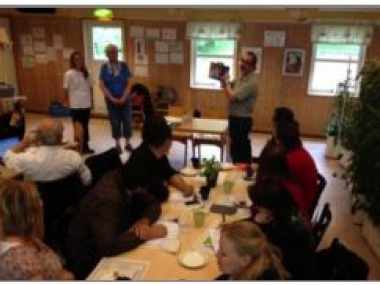Partner Cities Meet to "Enjoy" Sustainable Food in Gothenburg
Edited on
09 October 2017Sustainable, healthy food is a hot topic in Europe, and the Sustainable Food for Urban Communities URBACT project is now tackling this vast subject. Interesting and enjoyable exchanges on the theme "Enjoying" took place at the project workshop in Gothenburg late May 2013 focusing on the role of canteens and consumer behaviour in making improving our food system. Discover what happened during this transnational meeting and the project outputs.

The ambitious two-year Sustainable Food for Urban Communities URBACT project, gathering ten partner cities, will examine the environmental impact of food at all stages of the food chain; reduce levels of food waste and will address the way urban citizens have become disconnected from the food they eat, encouraging them to choose a diet of locally-grown, healthier produce, and if possible to be involved in its production.
The 3-day Gothenburg transnational meeting agenda included interesting workshops, a resilience test performed by the Local Support Group, a speed-presentation bringing together local and transnational experiences and a micro-consulting exchange with visitors from abroad bringing their expertise to the small educational farm Galaxen (Bergsjön).
The group made site-visits to a canteen for elderly people (connected to the municipality of Gothenburg) and had a workshop at Lärjeåns café and gardens, part of a set of social enterprises. They also visited a church (Bergsjöns kyrka) that recovers food from supermarkets and redistributes it and that connects people around shared meals helping less affluent with social and economical assistance.
Keywords from Gothenburg that partners will have reason to come back to: food-print, slow-food, pleasure, global approach, taste samples, good food/less good food, empower the people, "food-waste advisers", second-hand gardening, what if… happens, seasonal vegetables, use knowledge from immigrant families etc.
According to Steve Mariot from the City of Bristol, a "real highlight of the visit was a set of presentations looking at the carbon footprint of food and how this can be used to develop low carbon, nutritionally balanced menus. The issue of how these menus could be communicated was also discussed. Presentations were given and are available looking at the Swedish national carbon index and the contribution the food system makes. It also looked at individual contributions of different primary foods. Finally, the implications of reducing the carbon impact of food, retaining the same fraction of the carbon index, to achieve an 80% reduction in carbon emissions by 2050 in terms of menu choices was also presented. This led into an unresolved discussion over how this could be communicated to people. This needs following up both through the project and locally."
Presentations and outputs from the Gothenburg meeting are available here.
Next Sustainable Food for Urban Communities transnational meeting will take place in Oslo, on 10-12 September 2013 and will focus on "Growing".
The 3-day workshop, will combine field visits and interactive workshops exploring ways to grow and produce food in the city, in gardens, in parks, on rooftops, on balconies, on derelict lands....Exchanges will focus on various functions of Growing in an urban context, not only for food production but also for recreational, educational and social cohesion purposes, as well as on new uses of public & private spaces.
Read more :
- Sustainable Food in Urban Communities - URBACT website
- Gothenburg Meeting Presentations and Outputs - website
- Special Report - Sustainable Food in Urban Communities, Better food for better lives - URBACT website
- Innovative Ways to Produce Food: Inspirations for The Dutch City of Amersfoort - URBACT Blog
- Food in Urban Communities blog - website
Submitted by admin on
